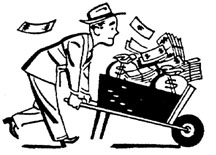
Financial Vulnerabilities At the Parish Level
POST-DEPOSIT EMBEZZLEMENTS
Just as water and electricity seek the path of least resistance, so too will a thief seek the easiest and safest means of lining his pockets with the wealth of others. In my September 2003 NOR article, “Priests & Lay Leaders Stealing From the Sunday Collection,” I addressed the phenomenon of Sunday collection theft in the Catholic Church in the U.S. As of this writing, the Church-wide conditions that allow, indeed encourage, such thefts remain unchanged.
The purpose of this present article is to point out that the establishment of a secure system for handling Sunday collection funds before they reach the bank will not ipso facto put an end to church embezzlements. An embezzler would much prefer to strike before the funds have been documented and deposited, but he will strike afterward if that is his only option. Indeed, anecdotal evidence concerning past embezzlements clearly establishes that a number of church embezzlers enrich themselves both before and after collection funds reach the parish bank account.
Before we examine various ways an embezzler can exploit a parish’s financial operations, it might be helpful to review what the U.S. Conference of Catholic Bishops (USCCB) and its fiscal watchdog, the Diocesan Fiscal Management Conference (DFMC), have done to assist parishes in the formidable task of protecting their revenue against theft and misappropriation. To make a long story short, they have done virtually nothing in that regard. Let me explain.
In 1992 the U.S. Catholic Conference (USCC, now USCCB) Accounting Practices Committee began a project to study and propose better diocesan internal financial controls. Three years later, a document entitled “Diocesan Internal Controls: A Framework” was unanimously approved by the Board of the DFMC, by the NCCB/USCC Committee on Budget and Finance and, in September 1995, by the USCC Administrative Board. Included in the Foreword of that document is a caveat stating that it was written to address concerns at the diocesan level and does not specifically deal with issues at the parish level. (As of this writing, anyone who wishes can download the document from the USCCB website, usccb.org. Once there, click on “Departments ” Activities” in the menu bar and then on “Finance/Accounting” on the next page; that will lead to another page listing several documents including “Diocesan Internal Controls: A Framework.”)
You May Also Enjoy
Unless women themselves realize what they have rejected and act to reclaim it, their situation, and the situation of all of us, will degenerate toward dehumanization.
The year is 2005. God is sitting on His throne; He has just returned from a short, 50-year vacation in the far reaches of the galaxy.
The question remains for us, how do we obey the precept, the commandment to share our superfluous goods with the poor?

